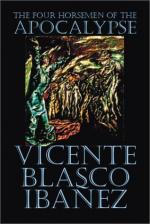|
This section contains 207 words (approx. 1 page at 400 words per page) |

|
Written at the start of World War I, this novel artfully combines the author's admiration for France and its revolutionary and democratic tradition with the history of an Argentine family that has close ties with both Germany and France. The Germans, who are depicted in full Teutonic stereotype, claim half the family. They behave true to their national "origins." They are arrogant, greedy, and aggressive, and entirely to blame for the outbreak of war. Here the reader recognizes a strong element of propaganda. Blasco Ibanez was invited to the front by the President of France in the hope that the Spanish writer could use his descriptive powers to create a work that would serve the war effort. The book is also about the contrast between the old and the new worlds, about the abnormal and anxious character of Europe, with its divisive national boundaries, its constant...
|
This section contains 207 words (approx. 1 page at 400 words per page) |

|




